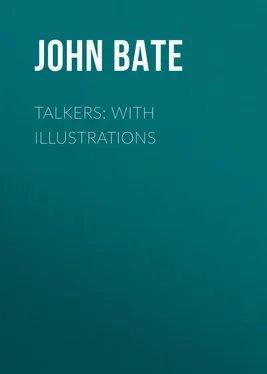John Bate - Talkers - With Illustrations
Здесь есть возможность читать онлайн «John Bate - Talkers - With Illustrations» — ознакомительный отрывок электронной книги совершенно бесплатно, а после прочтения отрывка купить полную версию. В некоторых случаях можно слушать аудио, скачать через торрент в формате fb2 и присутствует краткое содержание. Жанр: foreign_antique, foreign_prose, на английском языке. Описание произведения, (предисловие) а так же отзывы посетителей доступны на портале библиотеки ЛибКат.
- Название:Talkers: With Illustrations
- Автор:
- Жанр:
- Год:неизвестен
- ISBN:нет данных
- Рейтинг книги:5 / 5. Голосов: 1
-
Избранное:Добавить в избранное
- Отзывы:
-
Ваша оценка:
- 100
- 1
- 2
- 3
- 4
- 5
Talkers: With Illustrations: краткое содержание, описание и аннотация
Предлагаем к чтению аннотацию, описание, краткое содержание или предисловие (зависит от того, что написал сам автор книги «Talkers: With Illustrations»). Если вы не нашли необходимую информацию о книге — напишите в комментариях, мы постараемся отыскать её.
Talkers: With Illustrations — читать онлайн ознакомительный отрывок
Ниже представлен текст книги, разбитый по страницам. Система сохранения места последней прочитанной страницы, позволяет с удобством читать онлайн бесплатно книгу «Talkers: With Illustrations», без необходимости каждый раз заново искать на чём Вы остановились. Поставьте закладку, и сможете в любой момент перейти на страницу, на которой закончили чтение.
Интервал:
Закладка:
“He that cannot refrain from much speaking,” says Sir W. Raleigh, “is like a city without walls, and less pains in the world a man cannot take, than to hold his tongue; therefore if thou observest this rule in all assemblies thou shalt seldom err; restrain thy choler, hearken much and speak little, for the tongue is the instrument of the greatest good and greatest evil that is done in the world.”
“As it is the characteristic,” says Lord Chesterfield, “of great wits to say much in few words, so it is of small wits to talk much and say nothing. Never hold any one by the button or the hand in order to be heard out; for if people are unwilling to hear you, you had better hold your tongue than them.”
“The evil of this” (much speaking), says Bishop Taylor, “is very considerable in the accounts of prudence, and the effects and plaisance of conversation: and the ancients described its evil well by a proverbial expression; for when a sudden silence arose, they said that Mercury was entered, meaning that, he being their ‘loquax numen,’ their ‘prating god,’ yet that quitted him not, but all men stood upon their guard, and called for aid and rescue, when they were seized upon by so tedious an impertinence. And indeed, there are some persons so full of nothings, that, like the strait sea of Pontus, they perpetually empty themselves by their mouth, making every company or single person they fasten on to be their Propontis, such a one as was Anaximenes, who was an ocean of words, but a drop of understanding.”
You would do well to study the lesson, When to talk, and when to be silent . Silence is preferred by the wise and the good to superfluity of talking. You may read strange stories of some of the ancients, choosing silence to talking. St. Romualdus maintained a seven years’ silence on the Syrian mountains. It is said of a religious person in a monastery in Brabant, that he did not speak a word in sixteen years. Ammona lived with three thousand brethren in such silence as though he was an anchoret. Theona was silent for thirty years together. Johannes, surnamed Silentarius, was silent for forty-seven years. I do not mention these as examples for your imitation, and would not have you become such a recluse. These are cases of an extreme kind, – cases of moroseness and sullenness which neither reason nor Scripture justify. “This was,” as Taylor observes, “to make amends for committing many sins by omitting many duties; and, instead of digging out the offending eye, to pluck out both, that they might neither see the scandal nor the duty; for fear of seeing what they should not, to shut their eyes against all light.” The wiser course for you to adopt is the practice of silence for a time, as a discipline for the correction of the fault into which you have fallen. Pray as did the Psalmist, “Put a guard, O Lord, unto my mouth, and a door unto my lips.” “He did not ask for a wall,” as St. Gregory remarks, “but for a door, a door that might open and shut.” It is said of Cicero, he never spake a word which himself would fain have recalled; he spake nothing that repented him. Silence will be a cover to your folly, and a disclosure of your wisdom.
“Keep thy lips with all diligence.”
“A man that speaketh too much, and museth but little and lightly,
Wasteth his mind in words, and is counted a fool among men:
But thou when thou hast thought, weave charily the web of meditation,
And clothe the ideal spirit in the suitable garments of speech.”
Note well the discretion of silence . What man ever involved himself in difficulties through silence? Who thinks another a fool because he does not talk? Keep quiet, and you may be looked upon as a wise man; open your mouth and all may see at once that you are a simpleton. Ben Jonson, speaking of one who was taken for a man of judgment while he was silent, says, “This man might have been a Counsellor of State, till he spoke; but having spoken, not the beadle of the ward.”
Lord Lytton tells of a groom who married a rich lady, and was in fear as to how he might be treated by the guests of his new household, on the score of his origin and knowledge: to whom a clergyman gave this advice, “Wear a black coat, and hold your tongue.” The groom acted on the advice, and was considered a gentlemanly and wise man.
The same author speaks of a man of “weighty name,” with whom he once met, but of whom he could make nothing in conversation. A few days after, a gentleman spoke to him about this “superior man,” when he received for a reply, “Well, I don’t think much of him. I spent the other day with him, and found him insufferably dull.” “Indeed,” said the gentleman, with surprise; “why, then I see how it is: Lord – has been positively talking to you.”
This reminds one of the story told of Coleridge. He was once sitting at a dinner-table admiring a fellow guest opposite as a wise man, keeping himself in solemn and stately reserve, and resisting all inducements to join in the conversation of the occasion, until there was placed on the table a steaming dish of apple-dumplings, when the first sight of them broke the seal of the wise man’s intelligence, exclaiming with enthusiasm, “Them be the jockeys for me.”
Gay, in his fables, addressing himself to one of these talkers, says, —
“Had not thy forward, noisy tongue
Proclaim’d thee always in the wrong,
Thou might’st have mingled with the rest,
And ne’er thy foolish sense confess’d;
But fools, to talking ever prone,
Are sure to make their follies known.”
Mr. Monopolist, can you refrain a little longer while I say a few more words? I have in my possession several recipes for the cure of much talking, that I have gathered in the course of my reading, four of which I will kindly lay before you for consideration.
1. Give yourself to private writing ; and thus pour out by the hand the floods which may drown the head. If the humour for much talking was partly drawn forth in this way, that which remained would be sufficient to drop out from the tongue.
2. In company with your superiors in wisdom, gravity, and circumstances, restrain your unreasonable indulgence of the talking faculty. It is thought this might promote modest and becoming silence on all other occasions. “One of the gods is within,” said Telemachus; upon occasion of which his father reproved his talking. “Be thou silent and say little; let thy soul be in thy hand, and under command; for this is the rite of the gods above.”
3. Read and ponder the words of Solomon, “He that hath knowledge spareth his words; and a man of understanding is of excellent spirit. Even a fool when he holdeth his peace is counted wise: and he that shutteth his lips is esteemed a man of understanding” (Prov. xvii. 27, 28). Also the words of the Son of Sirach, “Be swift to hear, and if thou hast understanding, answer thy neighbour; if not, lay thy hand upon thy mouth. A wise man will hold his tongue till he see opportunity; but a babbler and a fool will regard no time. He that useth many words shall be abhorred; and he that taketh to himself authority therein shall be hated” (Ecclesiasticus v. 11-13). “In the multitude of words there wanteth not sin” (Prov. x. 19).
4. Attend more to business and action. It is thought that a diligent use of the muscles in physical labour may detract from the disposition, time, and power of excessive speech. Paul gives a similar suggestion, “And that ye study to be quiet, and to do your own business, and to work with your own hands as we commanded you” (1 Thes. iv. 11).
With these few words of advice I now leave you, my friend Monopolist, hoping they may have their due effect upon your talking faculty, and that when I meet you again in company I shall find you a “new edition, much amended and abridged:” “the half better than the whole.”
Читать дальшеИнтервал:
Закладка:
Похожие книги на «Talkers: With Illustrations»
Представляем Вашему вниманию похожие книги на «Talkers: With Illustrations» списком для выбора. Мы отобрали схожую по названию и смыслу литературу в надежде предоставить читателям больше вариантов отыскать новые, интересные, ещё непрочитанные произведения.
Обсуждение, отзывы о книге «Talkers: With Illustrations» и просто собственные мнения читателей. Оставьте ваши комментарии, напишите, что Вы думаете о произведении, его смысле или главных героях. Укажите что конкретно понравилось, а что нет, и почему Вы так считаете.












